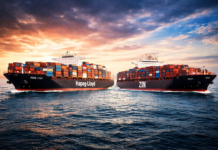
TT Club is continuing its efforts to convince cargo interests, supply chain professionals and enforcement agencies that the responsibility for mitigating container ship fires is shared by numerous entities involved from end to end of the entire global supply chain.
With its estimated sixty-day average occurrence of serious fires being maintained by the Zim Charleston fire in August and the TSS Pearl in the Red Sea in early October, TT is once more urging a more comprehensive approach to arresting the trend.
Peregrine Storrs-Fox, risk management director of TT Club, commented, “There were significant lessons coming from the sad incident on the MSC Flaminia, which cost the lives of three seafarers, particularly from the subsequent legal proceedings that adjudged the shipper and NVOC responsible for root cause errors.”
He added, “Despite the biennial updates to the IMDG Code, including multiple arising from this particular incident, the judge’s assessment that the regulations merely set the ‘baseline’ for good practice remains utterly true today.”
Ensuring compliance with the latest mandatorily applicable version of the IMDG Code is essential as a minimum standard for all those shipping dangerous goods by sea, according to TT Club, which advocates a comprehensive approach, striving to bring an understanding of all the factors contributing to these fire incidents to everyone involved in the movement of container cargo and therefore underlining their responsibilities for safety.
“Errors, misunderstandings, mis-declarations and inadequate packing and securing lie at the heart of many significant incidents, both at sea and in storage facilities,” pointed out TT Club.
TT explains, “Movement of cargo is initiated in the trading of goods – sellers and buyers – who instruct packers and whoever becomes the shipper. They have a duty of care as much as the packers, warehouse operators, forwarders, logistics companies, carriers of all modal types, cargo handlers and terminal operators. Attention to accurate classification and declaration is critical to improving the certainty of outcome from end to end. This requires truth as much as awareness of regulations and sound safety practices.”
TT, along with the UK P&I Club, has recently updated its guideline publication, ‘Book it Right, Pack it Tight’. This provides key insights for all involved in dangerous goods’ shipments, including a clear exposé of the more technical aspects of the IMDG Code.
Closely related to the issues specific to dangerous goods are the broader aspects of packing cargo in general. While the IMO/ILO/UNECE Code of Practice for Packing of Cargo Transport Units (CTU Code) remains non-mandatory international law, it is clearly referenced from the IMDG Code. Through its participation in the Cargo Integrity Group, TT has contributed to work on the ‘CTU Code – a quick guide’.





